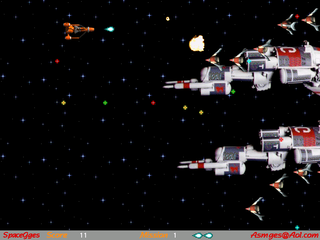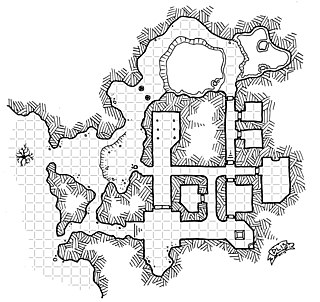Related Research Articles
A massively multiplayer online role-playing game (MMORPG) is a video game that combines aspects of a role-playing video game and a massively multiplayer online game.

A role-playing game is a game in which players assume the roles of characters in a fictional setting. Players take responsibility for acting out these roles within a narrative, either through literal acting or through a process of structured decision-making regarding character development. Actions taken within many games succeed or fail according to a formal system of rules and guidelines.

A role-playing video game, a role-playing game (RPG) or computer role-playing game (CRPG), is a video game genre where the player controls the actions of a character immersed in some well-defined world, usually involving some form of character development by way of recording statistics. Many role-playing video games have origins in tabletop role-playing games and use much of the same terminology, settings, and game mechanics. Other major similarities with pen-and-paper games include developed story-telling and narrative elements, player character development, complexity, as well as replay value and immersion. The electronic medium removes the necessity for a gamemaster and increases combat resolution speed. RPGs have evolved from simple text-based console-window games into visually rich 3D experiences.

A video game genre is an informal classification of a video game based on how it is played rather than visual or narrative elements. This is independent of setting, unlike works of fiction that are expressed through other media, such as films or books. For example, a shooter game is still a shooter game, regardless of where or when it takes place. A specific game's genre is open to subjective interpretation. An individual game may belong to several genres at once.
A massively multiplayer online game is an online video game with a large number of players on the same server. MMOs usually feature a huge, persistent open world, although there are games that differ. These games can be found for most network-capable platforms, including the personal computer, video game console, or smartphones and other mobile devices.
Player versus player (PVP) is a type of multiplayer interactive conflict within a game between human players. This is often compared to player versus environment (PvE), in which the game itself controls its players' opponents. The terms are most often used in games where both activities exist, particularly MMORPGs, MUDs, and other role-playing video games, to distinguish between gamemodes. PvP can be broadly used to describe any game, or aspect of a game, where players compete against each other. PvP is often controversial when used in role-playing games. In most cases, there are vast differences in abilities between players. PvP can even encourage experienced players to immediately attack and kill inexperienced players. PvP is often referred to as player killing in the cases of games which contain, but do not focus on, such interaction.

A dungeon crawl is a type of scenario in fantasy role-playing games (RPGs) in which heroes navigate a labyrinth environment, battling various monsters, avoiding traps, solving puzzles, and looting any treasure they may find. Video games and board games which predominantly feature dungeon crawl elements are considered to be a genre.
A virtual airline (VA) is a dedicated hobby organization that uses flight simulation to model the operations of an airline. Virtual airlines generally have a presence on the Internet, similar to a real airline. Many hundreds of virtual airlines of significance are currently active, with tens of thousands of participants involved at any one time.
Tactical role-playing games, also known as strategy role-playing games and in Japan as simulation RPGs, are a video game genre that combines core elements of role-playing video games with those of tactical strategy video games. The formats of tactical RPGs are much like traditional tabletop role-playing games and strategy games in appearance, pacing, and rule structure. Likewise, early tabletop role-playing games are descended from skirmish wargames such as Chainmail, which were primarily concerned with combat.
A cooperative video game, often abbreviated as co-op, is a video game that allows players to work together as teammates, usually against one or more non-player character opponents (PvE). Co-op games can be played locally using one or multiple input controllers or over a network via local area networks, wide area networks, or the Internet.
An action role-playing game is a subgenre of video games that combines core elements from both the action game and role-playing genre.
The history of massively multiplayer online games spans over thirty years and hundreds of massively multiplayer online games (MMOG) titles. The origin and influence on MMO games stems from MUDs, Dungeons & Dragons (D&D) and earlier social games.
In video games, a raid is a type of mission in Massively multiplayer online role-playing games (MMORPGs) where a much larger number than usual of people specifically gather in an attempt to defeat either: (a) another number of people at player-vs-player (PVP), (b) a series of computer-controlled enemies in a player-vs-environment (PVE) battlefield, or (c) a very powerful boss (superboss). This type of objective usually occurs within an instance dungeon, a separate server instance from the other players in the game. A raid may be highly planned and coordinated or arise nearly spontaneously through word of mouth communications in- and out-of game.
A healer is a type of character class in video gaming. When a game includes a health game mechanic and multiple classes, often one of the classes will be designed around the restoration of allies' health, known as healing, in order to delay or prevent their defeat. Such a class can be referred to as a healer. In addition to healing, healer classes are sometimes associated with buffs to assist allies in other ways, and nukes to contribute to the offense when healing is unnecessary.

Aeria Games, formerly known as Aeria Games and Entertainment, was an online game publisher. The corporate headquarters were in Berlin, Germany.

PlayerAuctions is a digital marketplace that connects buyers and sellers of various types of gaming genre such as Massively multiplayer online game (MMO) games, First-person shooters (FPS), Multiplayer online battle arena (MOBA), Mobile game, survival games, battle royale game etc. so they can buy and sell digital assets. These include in-game currency, items, skins, accounts, power leveling and boosting services, and CD keys for games and applications. The site is a neutral marketplace that supports player-to-player trading for popular online games such as RuneScape, Old School RuneScape, World of Warcraft, CSGO, PUBG, Path of Exile, League of Legends, Fortnite, Overwatch, GTA V, Warframe, Pokémon Go, Clash of Clans, EverQuest, ArcheAge, Final Fantasy XIV, Apex Legends, Elder Scrolls Online, Habbo, Fallout 76, and over 250 other games.
Kunlun Group or their alternative name KoramGame, is a Hong Kong software developer and publisher.
This is a non-comprehensive list that includes terms used in video games and the video game industry, as well as slang used by players.
References
- ↑ "Helping Parents Get Set - A Family Guide to Games" (PDF). Microsoft. 2006. Retrieved 2008-04-10.
- ↑ "Clans: Full Guide to Console Gaming Communities | Gamocial". www.gamocial.com. Retrieved 2017-05-04.
- ↑ Wagner, Michael (2007). Friedrich von Borries; Steffen P. Walz; Matthias Böttger (eds.). Space Time Play: Computer Games, Architecture and Urbanism - the Next Level . Birkhauser Verlag AG. p. 183. ISBN 978-3-7643-8414-2.
- ↑ "Star Wars Galaxies - Glossary". Archived from the original on 2007-11-29. Retrieved 2007-11-17.
A Player association is a group of players who have formalized their group using the in-game tools.
- ↑ "EVE Online Frequently Asked Questions, Corporations". Archived from the original on 2007-10-26. Retrieved 2007-11-17.
Corporations are groups of players joining together for a common goal or purpose, much like guilds or clans in other games.
- ↑ "About Free Companies". Final Fantasy XIV, The Lodestone. Retrieved 19 January 2023.
- ↑ Mark, Robert (1999). Professional Pilot Career Guide. McGraw-Hill Professional. p. 330. ISBN 0-07-134691-0.